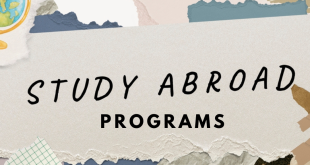Studying abroad is an incredible opportunity for students to expand their horizons, immerse themselves in new cultures, and gain invaluable life experiences. At the same time, there is the need to adapt and excel in a foreign educational system that comes with its own set of challenges. In order to successfully navigate these challenges and achieve academic success, it’s important to adopt some strategies that are tailored to the unique environment of a different educational system. And that’s the reason for this guide. I’m going to give you 10 tips on how to thrive in a foreign educational system and succeed academically while studying abroad.
Table of Contents
1. Understand Academic Expectations
Before you even begin to tackle the challenges of succeeding abroad, the first thing you need to do is learn about the structure and expectations of the foreign education system you’ll be entering.
Education systems vary greatly from one country to another.
There are differences in grading systems, teaching styles, student-teacher interactions, and academic expectations. So it’s smart to take the time to research.
Familiarize yourself with the specific nuances of the education system in your host country. How? By contacting current or former students. They are in the best position to offer valuable insights and advice based on their first-hand experience.
This will give you the opportunity to prepare for the challenges that lie ahead. As a result, you will be able to adapt your study habits, meet your course requirements, and excel in your studies.
Read here our tips on how to choose the right program to study abroad.
2. Develop New Learning Habits
The next step is to adapt to your new academic environment. This requires flexibility and effective study habits that meet the standards of your host university. Whether it is adjusting to a different teaching style or mastering a new subject, the effectiveness of your study skills is everything.
Start by creating a structured study plan that includes time for coursework, assignments and projects, and exam preparation. Also include time for extracurricular activities, leisure, and travel.
You can also experiment with different study techniques to find out what works best for you. We can suggest methods such as active learning, group study sessions, or the use of mnemonics to help with memorization.
The key is to stay open-minded and adaptable. Be willing to adjust your approach as needed to match the demands of your coursework.
3. Improve Language Proficiency
Fluency, or at least a good command of the local language, can have a significant impact on your academic success abroad. In fact, it can affect your entire experience abroad.
Whether your courses are in English or the local language, improving your language skills is key to succeeding in a foreign educational system.
Our advice is to dedicate time to learning the language. This can be done by taking language classes, practicing with native speakers, or finding language exchange opportunities.
By improving your language skills, you’ll also improve your communication skills, your academic performance, and your overall integration into the academic community you’re a part of.
Check here the importance of language learning when studying abroad.
4. Cultivate Time Management Skills
Our next tip is to brush up on your time management skills. This is especially true in a foreign academic environment, where you’re likely to encounter new distractions and responsibilities.
Cultivate strong time management skills. The goal is to find a good balance between academic commitments, extracurricular activities, and personal pursuits.
This can also help you create a realistic study schedule, prioritizing tasks and setting achievable goals along the way. You can use productivity tools, such as planners or digital apps, to track deadlines and manage your time effectively.
By mastering time management, you’ll stay organized and focused. As a result, you’ll maximize productivity, minimize stress, and excel academically.
5. Engage with Faculty and Peers
Another great way to ensure academic success and personal growth abroad is to build relationships with your faculty and peers.
Take advantage of every opportunity to interact with professors, participate in class discussions, and seek academic advice and feedback. Don’t be afraid to participate in class, ask questions and show your enthusiasm for learning.
On the other hand, you can also connect with fellow students from different backgrounds. Take an active role in group study sessions and school projects.
Interacting with faculty and other students will help you become part of a supportive learning community. This also improves your understanding of the course material.
6. Adapt to Different Teaching Styles
A foreign educational system has different teaching styles, classroom dynamics, and learning methods that you will need to become familiar with. You will also need to develop your ability to adapt in order to maximize your academic potential.
Be open-minded and flexible in your approach to learning. Don’t hesitate to experiment with new study techniques and embrace different perspectives.
Doing so will expand your intellectual horizons, enhance your understanding of topics, and, of course, improve your academic performance.
7. Seek Academic Support Services
Many study abroad programs offer a variety of academic support services. Their general purpose is to give students all the tools they need to achieve their academic goals.
Make sure you take advantage of all these resources. They will help you enhance your learning experience and overcome any academic challenges.
Whether you need help with writing, research, or subject-specific tutoring, find the support services you need. In addition, take advantage of the workshops and seminars offered by your institution.
In summary, you’ll never be short of help while studying abroad. The key is simply to look in the right place. And your university’s international student office is one of them.
8. Embrace Cultural Immersion and Extracurricular Activities
One of the main benefits of studying abroad is the prospect of immersing yourself in a new culture. And there’s no better way to learn about the customs, traditions, and social norms of your host country.
You can also interact with locals, participate in cultural activities, and explore your city’s surroundings. By immersing yourself in the culture, you’ll gain a deeper understanding of your new academic environment.
Beyond the classroom, extracurricular activities open doors to developing your social skills and broadening your horizons. Get involved in clubs, organizations, and volunteer initiatives that match your interests and passions.
9. Maintain a Healthy Work-Life Balance
Another aspect of studying abroad that should not be overlooked is your personal well-being. To give yourself the best chance of success in a foreign educational system, you need to establish a healthy work-life balance.
Alongside your academic responsibilities, make time for relaxation, leisure activities and cultural exploration. In other words, don’t neglect your need to recharge and avoid burnout.
In addition, establish clear boundaries between school work and personal time. As a result, you’ll maintain your motivation, productivity, and overall academic performance.
10. Reflect and Adapt
Our final tip for making the most of your study abroad experience is to take time to reflect on your experiences, challenges, and successes. Regular self-reflection allows you to assess your progress, identify areas for improvement, and make necessary adjustments to your approach.
In practice, you can keep a journal and engage in introspective exercises. You can also seek feedback from your mentors and advisors to gain insight into your academic journey. Armed with this information, you can proactively address challenges and adjust your strategies.
By cultivating this reflective mindset, you’ll continually evolve as a learner. You’ll have the space to effectively navigate academic transitions and ultimately excel in any foreign educational system.
Check also here our ranking of the best countries to study abroad.
Conclusion
Excelling in a foreign educational system requires proactive strategies, adaptability, and self-awareness on the part of students. While trying to understand the academic expectations of their university, they should also take the time to embrace the culture and learn the local language. This will expose them to different learning and teaching styles. By following the recommendations in this article, students will not only make the most of their study experience, but also create unforgettable memories overseas.
This post is also available in fr_FR.




 Aljawaz Your guide to study abroad
Aljawaz Your guide to study abroad
















